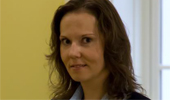Dr. Josipa Roksa speaks on “Academically Adrift: Limited Learning on College Campuses” at 7:30 p.m. on Wednesday, March 19, in Ellis 111.
Admission is free and open to the public. This lecture is sponsored by the College of Arts & Sciences.
Roksa is Associate Professor of Sociology and Education at the University of Virginia, where she currently serves as Special Advisor to the Provost. She is Associate Director of the Center for Advanced Study of Teaching and Learning in Higher Education and a Fellow of the National Forum on the Future of Liberal Education (2009-2012). She is co-author with Richard Arum of Academically Adrift: Limited Learning on College Campuses (University of Chicago Press, 2011).
Abstract: In spite of soaring tuition costs, more and more students go to college every year. A bachelor’s degree is now required for entry into a growing number of professions. And some parents begin planning for the expense of sending their kids to college when they’re born. Almost everyone strives to go, but almost no one asks the fundamental question posed by Academically Adrift: are undergraduates really learning anything once they get there?
For a large proportion of students, Richard Arum and Josipa Roksa’s answer to that question is a definitive no. Their extensive research draws on survey responses, transcript data, and, for the first time, the state-of-the-art Collegiate Learning Assessment, a standardized test administered to students in their first semester and then again at the end of their second year. According to their analysis of more than 2,300 undergraduates at 24 institutions, 45 percent of these students demonstrate no significant improvement in a range of skills—including critical thinking, complex reasoning, and writing—during their first two years of college. As troubling as their findings are, Arum and Roksa argue that for many faculty and administrators they will come as no surprise—instead, they are the expected result of a student body distracted by socializing or working and an institutional culture that puts undergraduate learning close to the bottom of the priority list. (from publisher’s description)
For more information, contact Dr. Neil Bernstein, Associate Professor of Classics and World Religions, and Dr. Herta Rodina, Associate Professor of Modern Languages.


















Comments